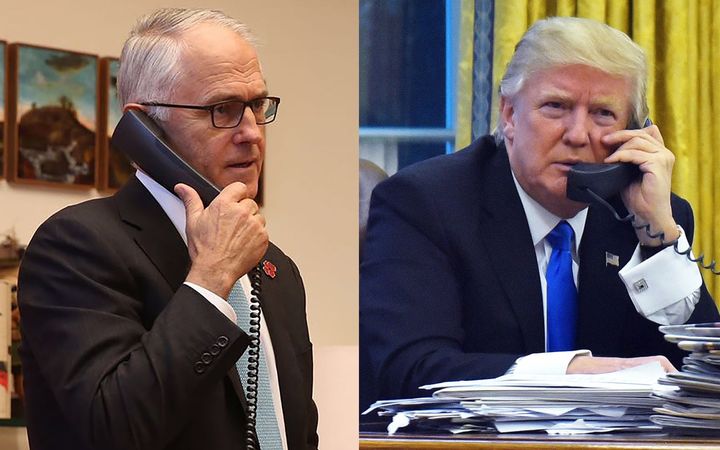Donald Trump’s contentious telephone conversation with Australian Prime Minister Malcolm Turnbull caused worried reactions in the United States. It was not merely the substance of the disagreement between the two leaders that produced concern. The principal point of contention was an earlier agreement on refugee policy that would allow more than 1,200 refugees being held by Australian authorities to migrate to the United States. Trump was wary of that agreement and pressed Turnbull hard for a justification.

More worrisome than the specific quarrel was Trump’s behavior toward the leader of a long-time U.S. ally. The session was originally scheduled to last one hour, but a miffed Trump abruptly ended it after 25 minutes. His conduct was reminiscent of a petulant adolescent.
However, such behavior may reflect more than a personality quirk of the U.S. president. It provides hints of an overall attitude on the part of the Trump administration toward U.S. allies in both Europe and East Asia. The outlines of a “Trump doctrine” regarding the allies appears to be taking shape, and it is one that likely will be unsettling to those countries.
It is a doctrine that seems to emphasize two main points. One is an insistence on unquestioning allied willingness to follow Washington’s policy lead regarding security issues—especially the campaign against radical Islam, but on other issues as well. The other key approach is an equally firm insistence that the allies do more—much more—for the collective defense effort. For the nations of East Asia, that will almost certainly mean large increases in defense spending and a willingness to adopt more hardline policies toward both North Korea and China.
The uneasiness of allied governments about Donald Trump was evident long before he entered the Oval Office. His comments during the election campaign signaled that there would be significant changes in Washington’s policies. On several occasions, candidate (and even president-elect) Trump termed NATO and other alliances obsolete, thereby injecting doubts about whether the United States would actually honor its commitments. His sarcastic comment that the Japanese would probably just watch another country’s war with the United States on their Sony television sets captured the extent of his cynical lack of confidence in that relationship. He prodded Japan and South Korea to take more responsibility for their defense, and on one occasion even stated that he would be receptive to those nations acquiring their own nuclear deterrents, implying that they might not be able to rely on U.S. protection.
Once in office, though, the actions of Trump and his advisers have made it clear that the worst fears of allied governments were exaggerated. During his first week as president, Trump assured German Chancellor Angela Merkel that he considered NATO to be essential. (Although how and why an “obsolete” alliance could be essential he did not explain.) Shortly thereafter, he reassured Japanese Prime Minister Shinzo Abe regarding the bilateral alliance. In early February, Secretary of Defense James Mattis and National Security Advisor Michael Flynn were in South Korea and Japan to stress the continuing U.S. devotion to their security.
Before those allies (and others) begin to relax, however, they need to understand that the security commitments are not unconditional. Throughout the election campaign, Trump excoriated allies for free-riding on Washington’s defense efforts. That view was also reflected in other comments that foreign nations, even supposed friends of the United States, were guilty of unfair trade practices and taking advantage of gullible American negotiators. Both the president and his advisers have made similar accusations since his inauguration. Such an attitude indicates that “America First” is not just a slogan. Burden sharing and “fair trade” promise to be higher-profile issues in allied relations than ever before.
Tokyo and Seoul will almost certainly encounter unprecedented demands to make more serious defense efforts. That means that the Trump administration will have little patience with South Korea’s continuing to spend a mere 2.5 percent of the country’s annual Gross Domestic Product on defense. There is likely to be even less patience with Japan’s self-imposed ceiling of a paltry 1 percent of GDP.
The Trump administration will expect Japan and South Korea to be genuine military allies, not security dependents masquerading as allies. And although none of the governments may say so publicly, such an alliance will be implicitly directed against China. Trump’s famous telephone conversation with Taiwanese President Tsai ing-wen and complaints about China’s trade practices suggest a further chill in what had already become a somewhat frosty bilateral relationship during the Obama years. Likewise, it is difficult to imagine Trump retreating from Washington’s established position regarding the South China Sea. There are already indications that Japan, at least, is anticipating the greater emphasis on burden sharing and is adopting a more robust security role.
While the Trump administration may pressure Japan and South Korea into becoming more effective allies, it is likely to jettison small or feckless supposed allies. High on that list would be the Philippines—especially under the erratic rule of current President Rodrigo Duterte. In all aspects of his dealings, both business and political, Donald Trump has emphasized loyalty. Duterte’s disrespect of its long-time treaty ally and protector, the United States, and Manila’s rapidly warming relations with China, are precisely the types of behavior that might well cause President Trump to execute a strategic divorce.
The bottom line is that allied fears of America’s adoption of an “isolationist” policy, or even one of realism and restraint, are unwarranted. Trump and most of his advisers seem as committed to U.S. primacy in both Europe and East Asia as all previous administrations since the end of World War II. But there will be changes in both the tone and substance of U.S. policy.
Washington’s behavior will consist more of abrasive demands rather than requests and quiet diplomacy. Moreover, if an ally balks at greater burden sharing and loyally backing U.S. security initiatives, tensions in the relationship are certain, and the risk of losing U.S. protection is no longer insignificant. Trump’s America First policy means giving highest priority to U.S. interests, not maintaining cordial alliance relations. That is a major change that Washington’s partners in East Asia and Europe will have to face.
